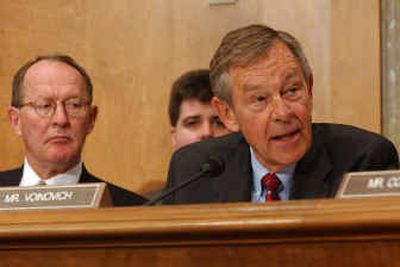Divided panel advances Bolton nomination

WASHINGTON – A deeply divided Senate Foreign Relations Committee voted Thursday to forward John Bolton’s nomination as U.N. ambassador without an up or down recommendation, setting up a high-stakes struggle in the full Senate.
The unusual maneuver kept Bolton’s contentious nomination alive.
But it was short of the full endorsement President Bush wanted. And it betrayed unease among senators on both sides of the aisle over Bolton, a hard-charging senior State Department official whom Democrats have accused of mistreating subordinates and trying to manipulate intelligence.
Sen. George Voinovich, R-Ohio, defected from Republican ranks and announced he would not support Bolton, calling the nominee “the poster child of what someone in the diplomatic corps should not be.”
Voinovich, who termed Bolton the wrong man at a time when the United States needs to improve its image around the world, nonetheless agreed to let the nomination move out of committee. It did so on a straight party-line vote, 10-8.
Bolton’s prospects on the Senate floor appear good. To stop his confirmation, Democrats and the Senate’s one independent would have to vote as a bloc and persuade five Republicans to join Voinovich in opposition.
Bush has called the hawkish Bolton the right man to help enact badly needed reforms at the United Nations. He has put considerable White House prestige behind his pick for the high-profile U.N. post.
The Senate debate appears likely to become a crucible for arguments over the direction of Bush’s foreign policy, and could see both supporters and opponents throw considerable political resources into the fray.
After the vote, Sen. Christopher Dodd, D-Conn., said Democrats might try to block the nomination by filibustering it.
A full confirmation vote on Bolton will occur before Memorial Day, but won’t be scheduled until after the Senate resolves its dispute over judicial nominees, said Eric Ueland, the chief of staff for Senate Majority Leader Bill Frist. Republicans want to do away with the ability of Democrats to filibuster, to effectively kill a handful of Bush’s judicial nominees.
If Republicans prevail, Democrats have threatened to slow down the work of the Senate, which could delay the Bolton vote.
The Senate committee abruptly delayed its consideration of Bolton on April 19, after allegations arose that he tried to have lower-level analysts who disagreed with him fired, and that he made remarks on Cuba, Syria and North Korea that went beyond official policy.
In more than five hours of committee debate Thursday, his strongest Republican supporters said the allegations had been put to rest during a three-week investigation involving 29 interviews and hundreds of pages of documents.
“His blunt style alienated some colleagues. But there is no evidence that he has broken laws or engaged in serious ethical misconduct,” said the panel’s chairman, Sen. Richard Lugar, R-Ind.
Democrats countered by citing testimony of current and former officials who worked with Bolton over the last four years when he has been in charge of weapons proliferation issues at the State Department. Some said he ran roughshod over subordinates, cherry-picked intelligence that supported his position and did not listen to others’ viewpoints.
At the United Nations, they said, Bolton’s statements on threats from North Korea or Iran might not be believed, while some countries would use his reputation as a U.N.-basher as an excuse to ignore calls for reform.